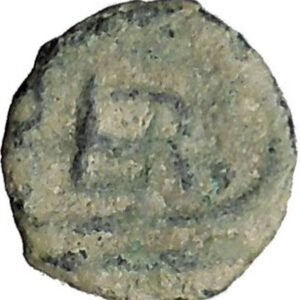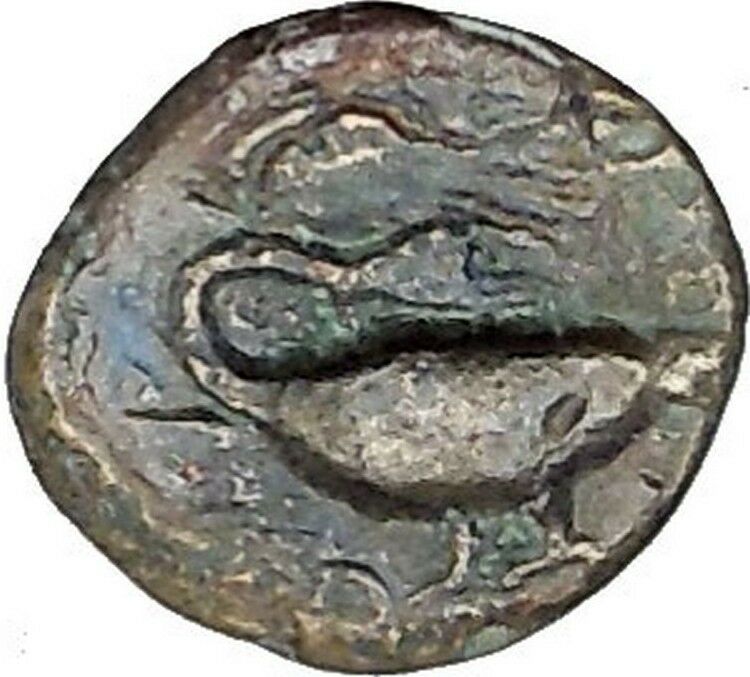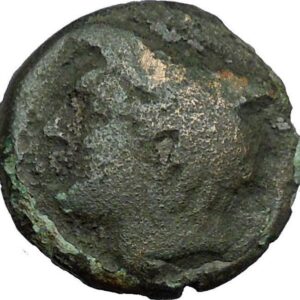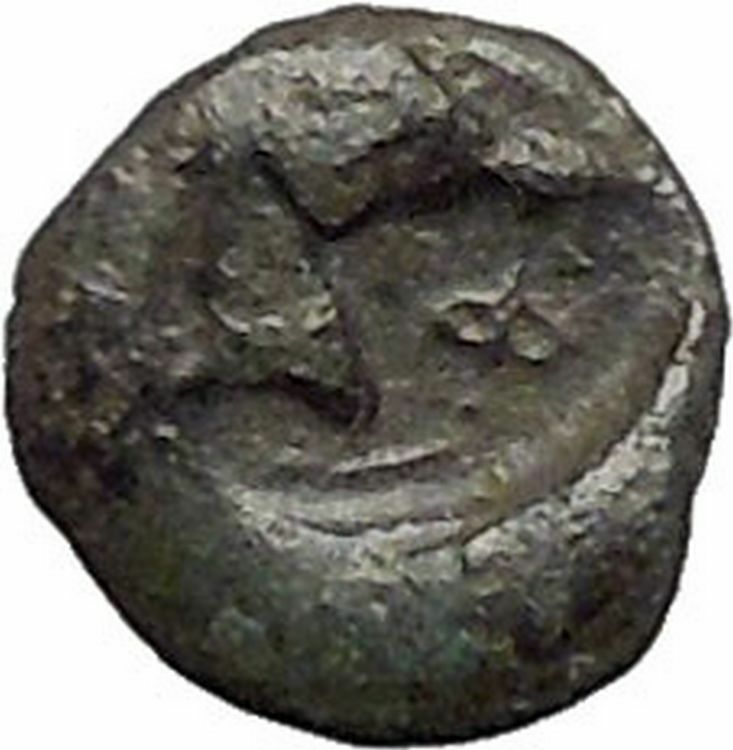|
Indo Greek Kingdom in India
Menander I, Soter – King circa 155-130 B.C.
Silver Drachm 15mm (2.44 grams)
Reference: Bopearachchi Series 6, B; cf. SNG ANS 702-14; HGC 12, 188.
BAΣIΛEΩΣ ΣΩTHPOΣ MENANΔPOY, Diademed heroic bust to left, seen from behind, wearing aegis over shoulder and brandishing spear.
Athena Alkidemos standing to right; monogram in left field, Kharosthi inscription around.
This king was famous in Buddhist narrative as king “Milinda”, who was said to have been a convert to Buddhism after debating philosophical points with the sage Nagasena. Perhaps the best-known of the Indo-Greek kings, Menander was appointed by Eukratides to rule the areas south of the Hindu Kush. His colleages in this task were Apollodotos and, later, Zoilos. According to Buddhist tradition, in which he is named Milinda, Menander was a just and powerful ruler and a convert to Buddhism.
You are bidding on the exact item pictured, provided with a Certificate of Authenticity and Lifetime Guarantee of Authenticity.
 Athena or Athene (Latin: Minerva), also referred to as Pallas Athena, is the goddess of war, civilization, wisdom, strength, strategy, crafts, justice and skill in Greek mythology. Minerva, Athena’s Roman incarnation, embodies similar attributes. Athena is also a shrewd companion of heroes and the goddess of heroic endeavour. She is the virgin patron of Athens. The Athenians built the Parthenon on the Acropolis of her namesake city, Athens, in her honour (Athena Parthenos). Athena’s cult as the patron of Athens seems to have existed from the earliest times and was so persistent that archaic myths about her were recast to adapt to cultural changes. In her role as a protector of the city (polis), many people throughout the Greek world worshiped Athena as Athena Polias (“Athena of the city”). Athens and Athena bear etymologically connected names. Athena or Athene (Latin: Minerva), also referred to as Pallas Athena, is the goddess of war, civilization, wisdom, strength, strategy, crafts, justice and skill in Greek mythology. Minerva, Athena’s Roman incarnation, embodies similar attributes. Athena is also a shrewd companion of heroes and the goddess of heroic endeavour. She is the virgin patron of Athens. The Athenians built the Parthenon on the Acropolis of her namesake city, Athens, in her honour (Athena Parthenos). Athena’s cult as the patron of Athens seems to have existed from the earliest times and was so persistent that archaic myths about her were recast to adapt to cultural changes. In her role as a protector of the city (polis), many people throughout the Greek world worshiped Athena as Athena Polias (“Athena of the city”). Athens and Athena bear etymologically connected names.
Menander I Soter (“Menander I the Saviour”; known in Indian Pali sources as Milinda) was an Indo-Greek King of the Indo-Greek Kingdom (165/155 -130 BC) who administered a large empire in the Northwestern regions of the Indian Subcontinent from his capital at Sagala. Menander is noted for having become a patron of Buddhism.
Menander was initially a king of Bactria. After conquering the Punjab he established an empire in the Indian Subcontinent stretching from the Kabul River valley in the west to the Ravi River in the east, and from the Swat River valley in the north to Arachosia (the Helmand Province). Ancient Indian writers indicate that he launched expeditions southward into Rajasthan and as far east down the Ganges River Valley as Pataliputra (Patna), and the Greek geographer Strabo wrote that he “conquered more tribes than Alexander the Great.”
 Large numbers of Menander’s coins have been unearthed, attesting to both the flourishing commerce and duration of his realm. Menander was also a patron of Buddhism, and his conversations with the Buddhist sage Nagasena are recorded in the important Buddhist work, the Milinda Panha (“The Questions of King Milinda”; panha meaning “question” in Pali). After his death in 130 BC, he was succeeded by his wife Agathokleia who ruled as regent for his son Strato I. Buddhist tradition relates that he handed over his kingdom to his son and retired from the world, but Plutarch relates that he died in camp while on a military campaign, and that his remains were divided equally between the cities to be enshrined in monuments, probably stupas, across his realm. Large numbers of Menander’s coins have been unearthed, attesting to both the flourishing commerce and duration of his realm. Menander was also a patron of Buddhism, and his conversations with the Buddhist sage Nagasena are recorded in the important Buddhist work, the Milinda Panha (“The Questions of King Milinda”; panha meaning “question” in Pali). After his death in 130 BC, he was succeeded by his wife Agathokleia who ruled as regent for his son Strato I. Buddhist tradition relates that he handed over his kingdom to his son and retired from the world, but Plutarch relates that he died in camp while on a military campaign, and that his remains were divided equally between the cities to be enshrined in monuments, probably stupas, across his realm.
|





 Athena or Athene (Latin: Minerva), also referred to as Pallas Athena, is the goddess of war, civilization, wisdom, strength, strategy, crafts, justice and skill in Greek mythology. Minerva, Athena’s Roman incarnation, embodies similar attributes. Athena is also a shrewd companion of heroes and the goddess of heroic endeavour. She is the virgin patron of Athens. The Athenians built the Parthenon on the Acropolis of her namesake city, Athens, in her honour (Athena Parthenos). Athena’s cult as the patron of Athens seems to have existed from the earliest times and was so persistent that archaic myths about her were recast to adapt to cultural changes. In her role as a protector of the city (polis), many people throughout the Greek world worshiped Athena as Athena Polias (“Athena of the city”). Athens and Athena bear etymologically connected names.
Athena or Athene (Latin: Minerva), also referred to as Pallas Athena, is the goddess of war, civilization, wisdom, strength, strategy, crafts, justice and skill in Greek mythology. Minerva, Athena’s Roman incarnation, embodies similar attributes. Athena is also a shrewd companion of heroes and the goddess of heroic endeavour. She is the virgin patron of Athens. The Athenians built the Parthenon on the Acropolis of her namesake city, Athens, in her honour (Athena Parthenos). Athena’s cult as the patron of Athens seems to have existed from the earliest times and was so persistent that archaic myths about her were recast to adapt to cultural changes. In her role as a protector of the city (polis), many people throughout the Greek world worshiped Athena as Athena Polias (“Athena of the city”). Athens and Athena bear etymologically connected names. Large numbers of Menander’s coins have been unearthed, attesting to both the flourishing commerce and duration of his realm. Menander was also a patron of Buddhism, and his conversations with the Buddhist sage Nagasena are recorded in the important Buddhist work, the Milinda Panha (“The Questions of King Milinda”; panha meaning “question” in Pali). After his death in 130 BC, he was succeeded by his wife Agathokleia who ruled as regent for his son Strato I. Buddhist tradition relates that he handed over his kingdom to his son and retired from the world, but Plutarch relates that he died in camp while on a military campaign, and that his remains were divided equally between the cities to be enshrined in monuments, probably stupas, across his realm.
Large numbers of Menander’s coins have been unearthed, attesting to both the flourishing commerce and duration of his realm. Menander was also a patron of Buddhism, and his conversations with the Buddhist sage Nagasena are recorded in the important Buddhist work, the Milinda Panha (“The Questions of King Milinda”; panha meaning “question” in Pali). After his death in 130 BC, he was succeeded by his wife Agathokleia who ruled as regent for his son Strato I. Buddhist tradition relates that he handed over his kingdom to his son and retired from the world, but Plutarch relates that he died in camp while on a military campaign, and that his remains were divided equally between the cities to be enshrined in monuments, probably stupas, across his realm.




